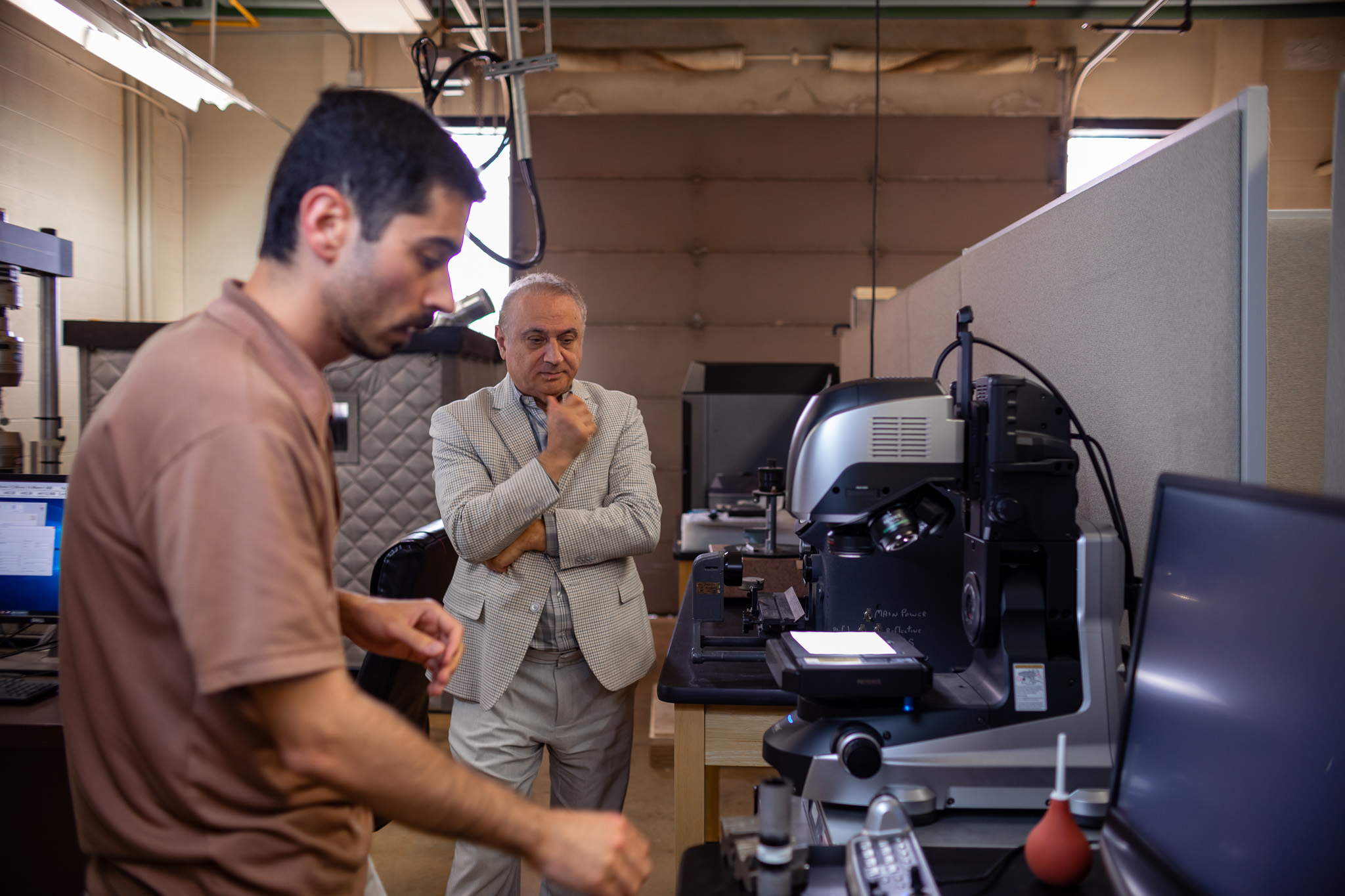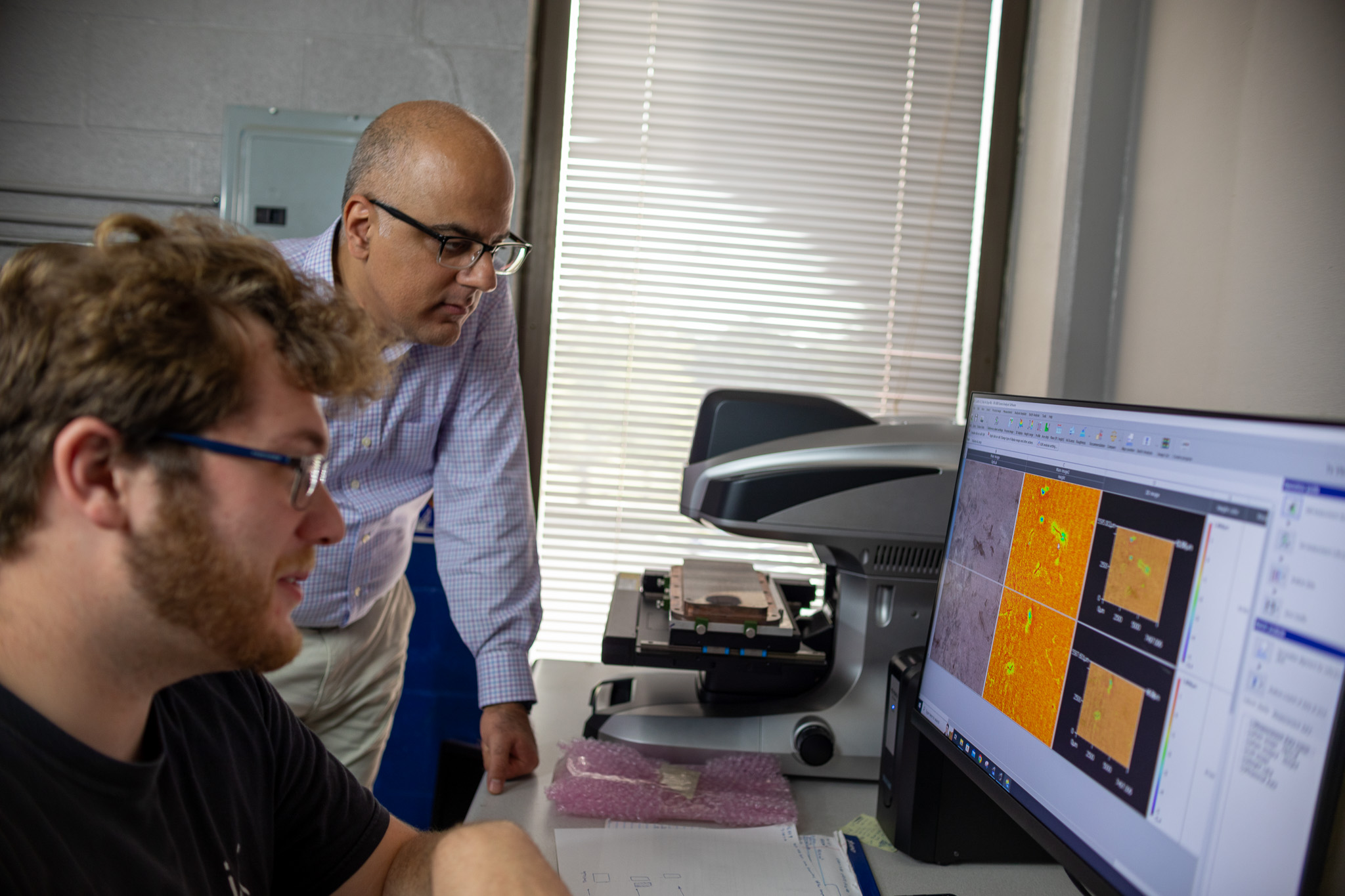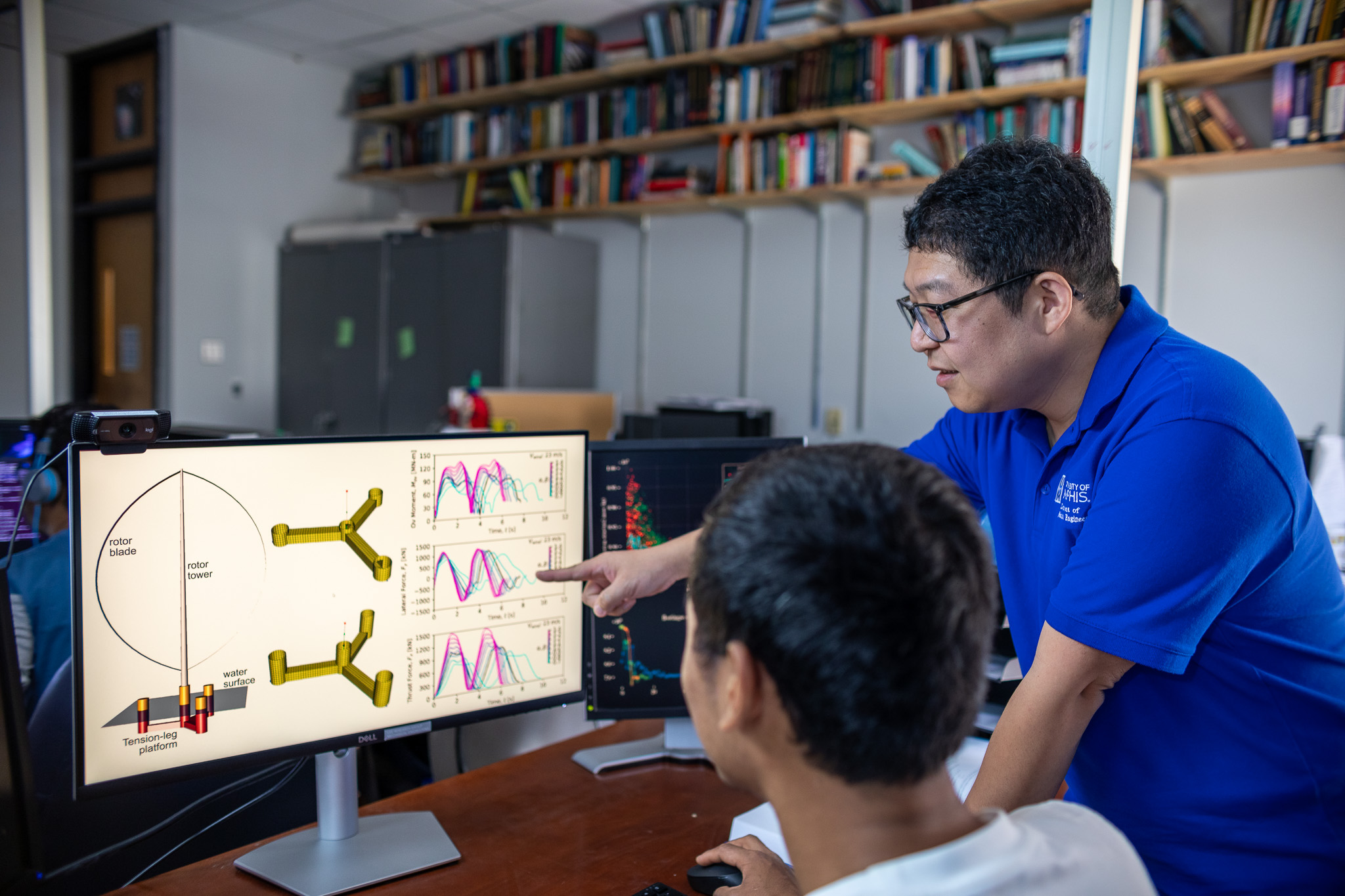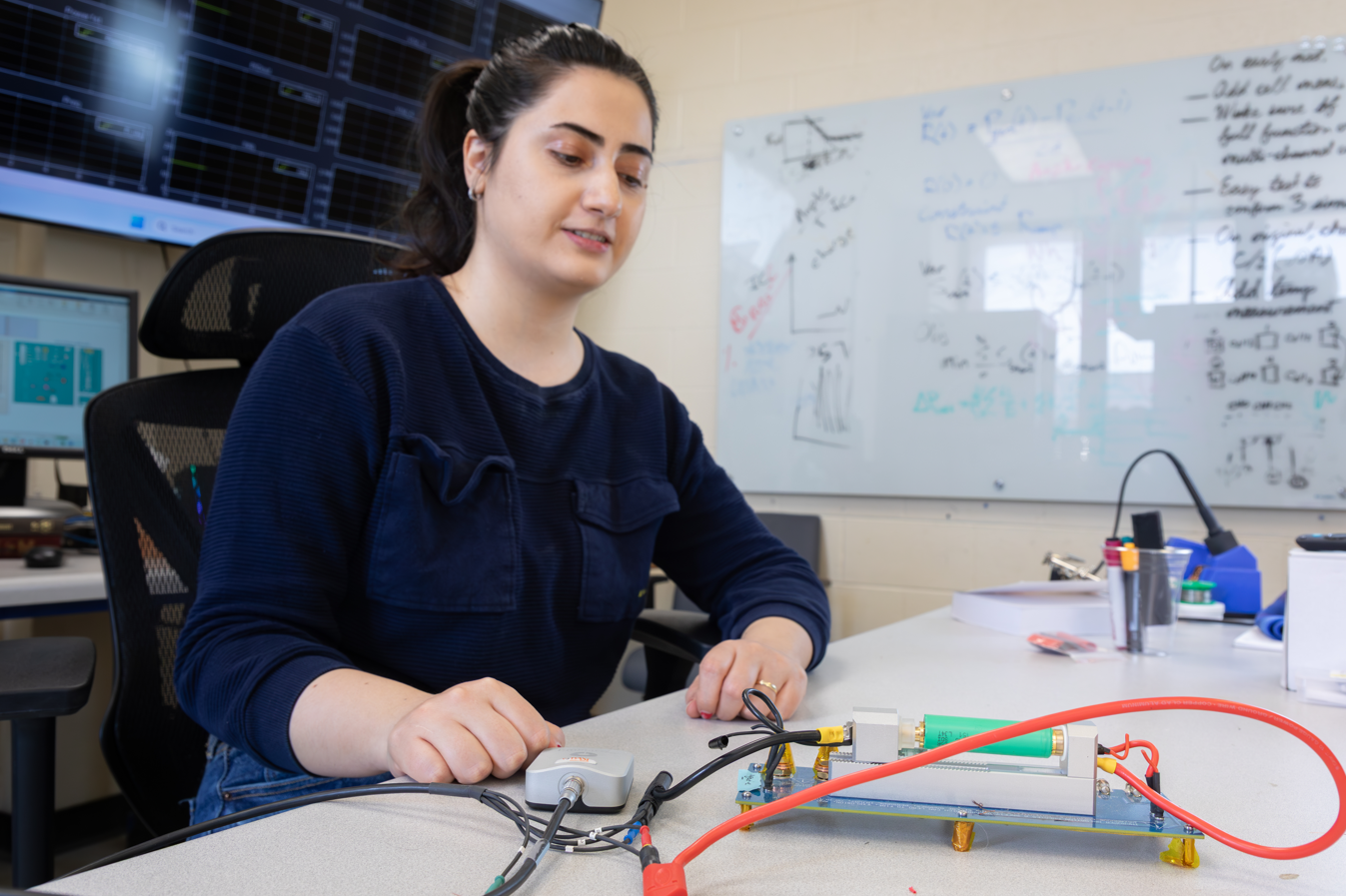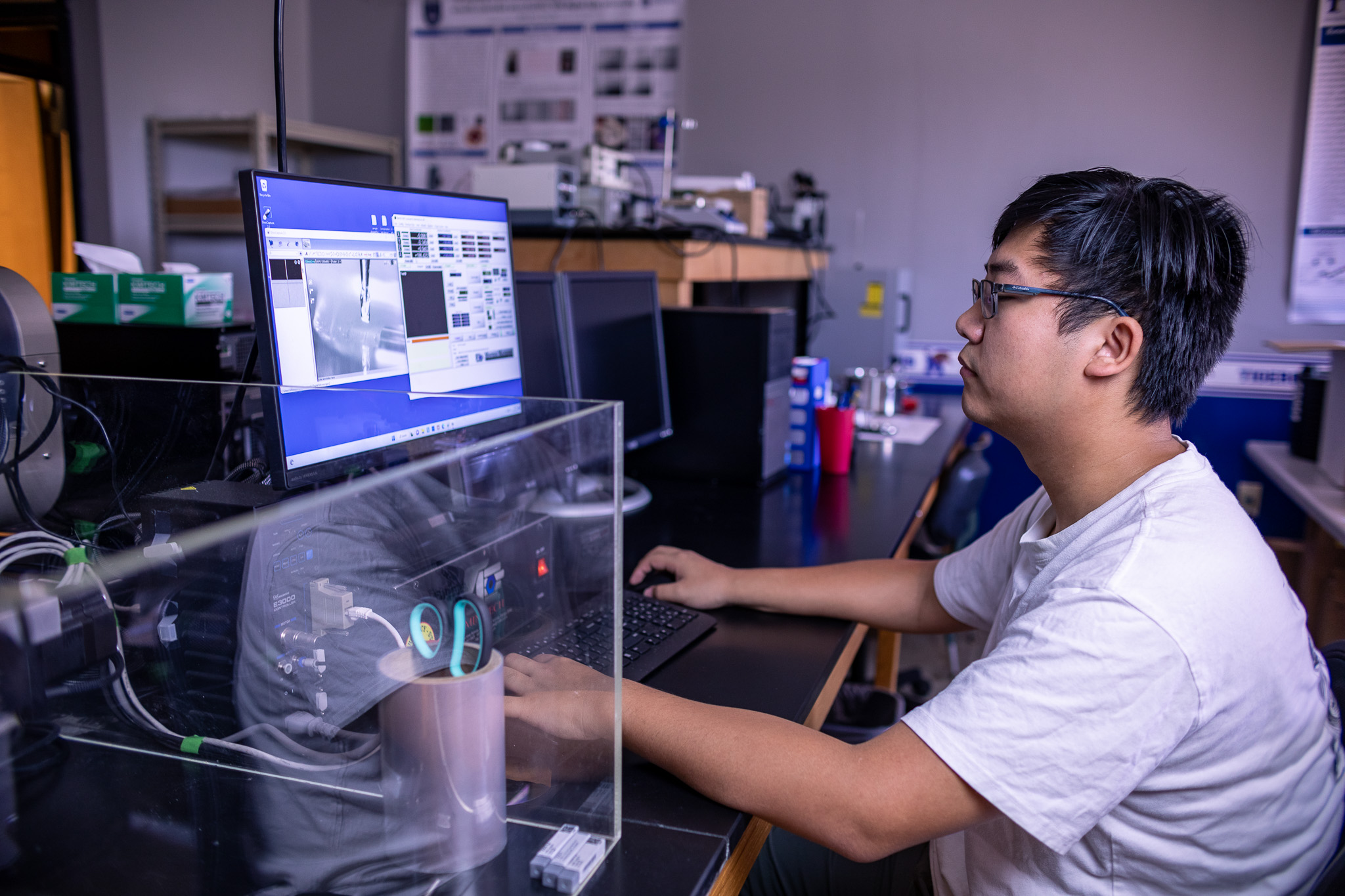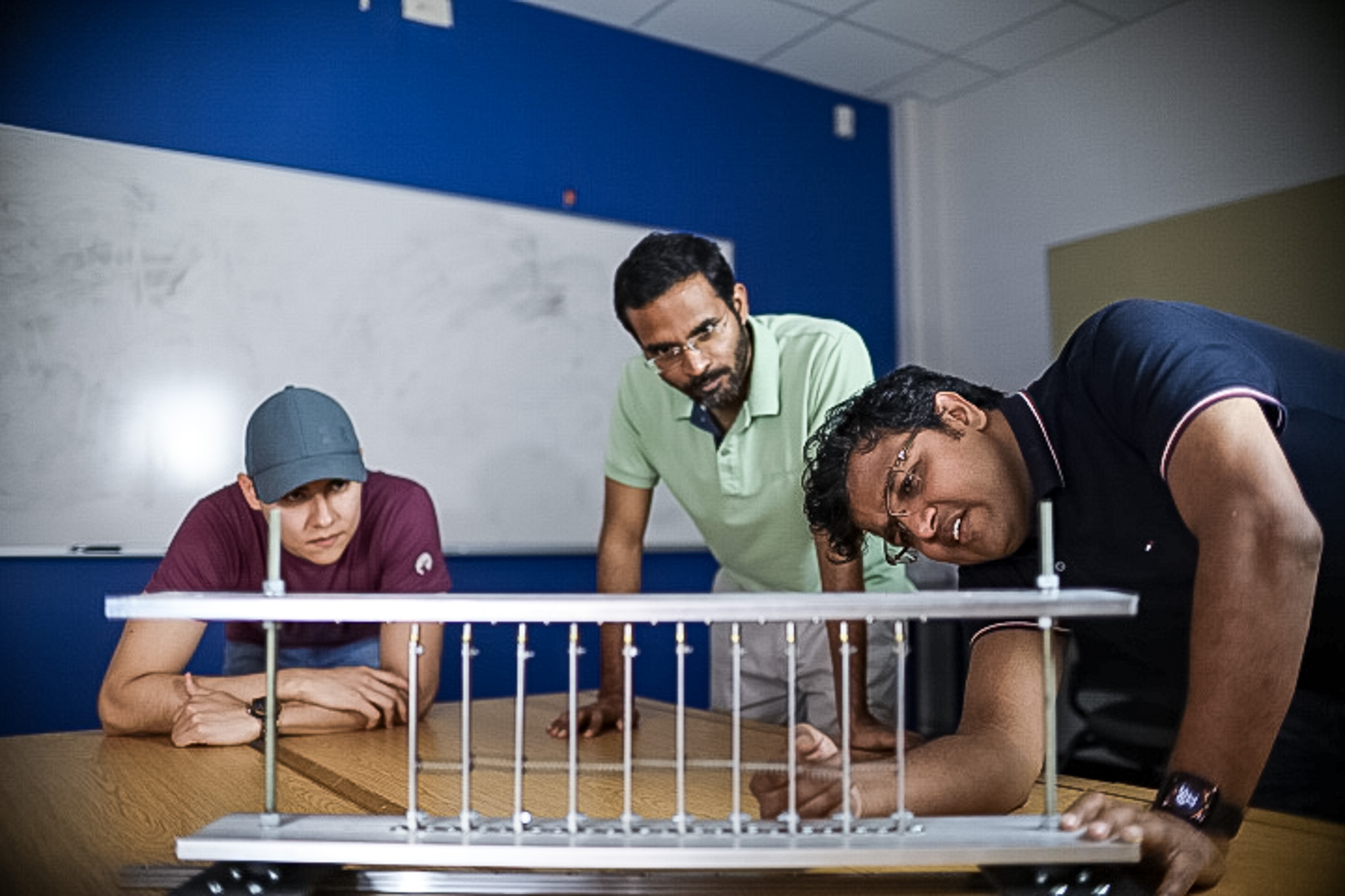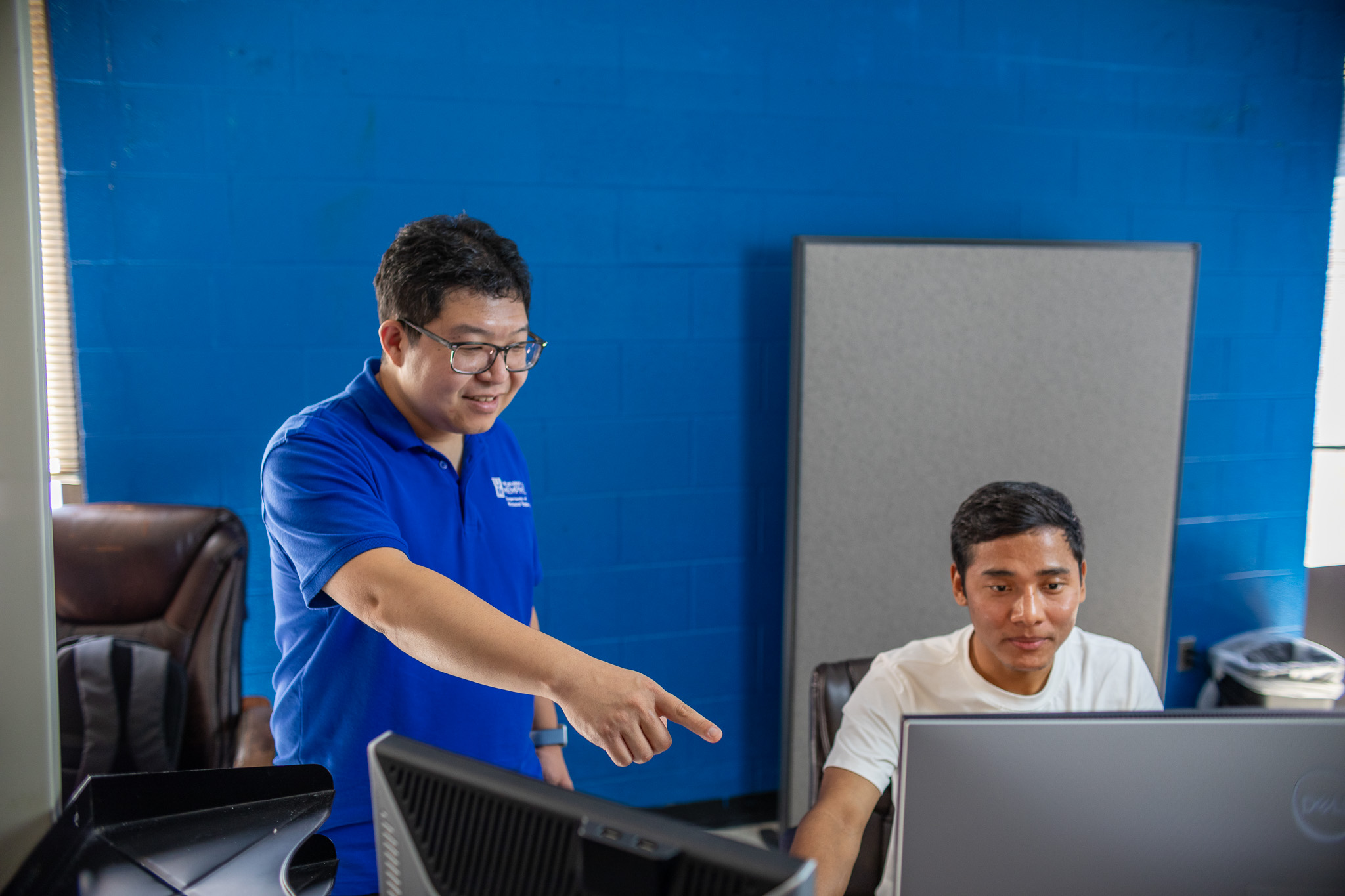Mechanical Engineering
Mechanical Engineering Research
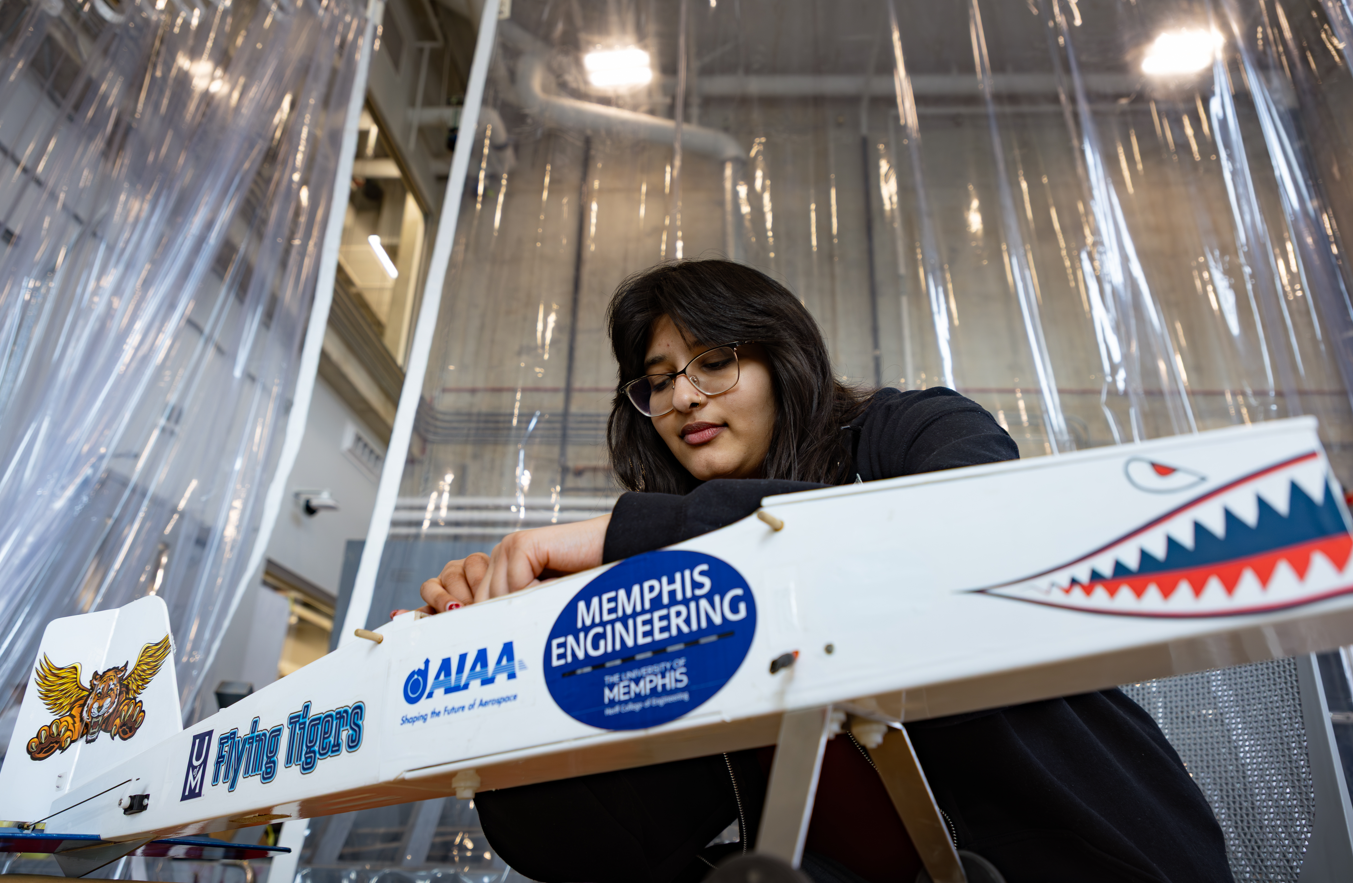
The mechanical engineering department at the University of Memphis has an active research program with the graduate study and research categorized under two basic areas of specialty - thermo/fluid and applied mechanics/materials. The department has identified manufacturing and materials and energy as key areas of strategic growth for the future. The programs of study are flexible and can be adjusted to fit personal needs and interests. The curriculum is designed to assist individuals who seek professional careers as advanced engineers, researchers, or teachers. Examples of research currently ongoing in the department include: Structural health monitoring, Packaging, Biomaterials and Biomechanics, Computational Mechanics and Computational Fluid Dynamics, Energy, Biofuels (production and testing), Low Gravity Fluid Management and cryogenics, Gas Turbine Heat Transfer and Gas Turbine Combustion. These research projects have been funded by a wide variety of sources such as Department of Energy (DOE), National Science Foundation (NSF), National Aeronautics and Space Administration (NASA), National Institute of Health (NIH), and biomedical and consumer product companies (e.g., Smith+Nephew, Medtronics, etc.). Graduates of our program receive excellent training in research and development, and have gone on to demonstrate excellence in their chosen careers having reached the highest levels of professional achievements.
RESEARCH AREAS
RESEARCH FACILITIES
Research Areas
- Fatigue of materials and structures
- Fracture mechanics
- Additive manufacturing
Brief Description
Dr. Fatemi's primary research interests involve materials mechanical behavior in general and fatigue and fracture mechanics in particular. He has published over 250 refereed papers dealing with these topics, both at the basic level helping to understand fundamental fatigue damage mechanisms, as well as in the applied areas facilitating applications to the design and life prediction of engineering components and structures.
Research Laboratory
The Fatigue and Fracture Research Laboratory is located in the Engineering Science building in ES 115 and houses state-of-the-art facilities for conducting material fatigue and fracture experiments. The equipment includes three servo-hydraulic material testing systems, two of them with axial load frame capacities of 10 kN and 50 kN, and another with multiaxial axial-torsion loading capability with 100 kN axial load and 1000 N.m torque capacities. Other instruments include digital scanning microscope, digital image correlation (DIC) system, environmental chamber, as well as other equipment and instruments.
Research Applications
- Automotive and aerospace industries
- Biomedical devices
- Any component or structure subject to cyclic loads
Brief Description
More that 50% of all mechanical failures are attributed to fatigue fractures. All materials can suffer from fatigue failure, including metals, polymers, elastomers, ceramics, and composites. Most engineering structures are subjected to cyclic loading, therefore, fatigue failure is a major design consideration.
Research Sponsors
- Application of fracture mechanics to assessment of defects in cast steel, Steel Foundry
Society of America, 2022-2023
- Fatigue life prediction of welded components, Hyundai Motor Company, 2021-2023
- Fatigue damage assessment and life prediction of additive manufactured metals, Office of Naval Research, 2020-2024
Research Areas
- Turbulence
- Computational Fluid Dynamics
Brief Description
Our research is at the intersection of fluid dynamics and computational science with
the goal of elucidating fundamental details of turbulence and understanding its effects
on engineering applications. We develop and employ computational fluid dynamics
and novel data analysis.
Research Laboratory
Flow Research Center: Computational Group
Faculty: Dr. Foti and Dr. Marchetta
Equipment
- High performance computer cluster
- Computer workstations
Research Applications
- Wind energy, rotorcraft and vortex-dominated flows
- Atmospheric boundary layers
- Energy production and storage
Brief Description
Our research focus is on complex turbulent flows characterized by dominant coherent
structures and multi-scale physics. These characteristics are ubiquitous in many relevant
engineering flows such as wind turbines, rotorcraft, bluff bodies, atmospheric flows,
combustion, wall-bounded flows, aircraft, and biological flows.
Research Sponsors
- National Science Foundation: ERI: Formation Mechanisms and Modeling of Wake Meandering
in Wind Farms
- US Department of Energy: Building partnerships for development of sustainable energy
systems with atmospheric measurements
- Army Research Laboratory: Optical Turbulence in HEL Targeting
- Sandia National Laboratories: Vent Gas Failure Propagation in Grid-Scale Battery Racks
- Tennessee Department of Transportation: Stormwater Conveyance from Bridge Decks
Research Areas
- Lab-on-a-Chip
- Microfluidics
- Microfabrication
- Acoustic bubbles
- Biomedical devices and applications
Brief Description
My research focuses on microfluidics, biomedical devices and acoustic microfluidics
technologies, seeking to engineer revolutionary micro/nano systems for addressing
the problems in biological and biomedical research related to human health.
Research Laboratory
Microfluidics laboratory focuses on developing innovative micro/nanofluidic devices
and systems using microfabrication technology to solve problems in healthcare.
Microfluidics Lab includes three parts microfabrication: Biosample preparation, and
Experimentation. The equipment in each part are:
- Microfabrication: CNC Micromilling Machine, Thin-film Fabrication, Inkjet Printer, Molding and Bonding Equipment, etc.
- Biosample preparation: Biological Safety Cabinet, CO2 Incubator, Bio Refrigerator and Freezer, etc.
- Experimentation: Inverted Microscope, Voltage Amplifier, Function generator, Syringe Pump, etc.
Lab location: ES 323
Research Applications
- Drug delivery
- Blood disease study
- Cell manipulation
- Biomedical devices and treatments
Brief Description
By engineering and controlling acoustically actuated gas/liquid interfaces in microfluidics,
its associated phenomena can be applied in solving various biomedical research problems,
including biofluid transportation at microscale, cell manipulation (trapping, enrichment,
separation, disaggregation, lysis, single cell analysis, cell-cell interaction analysis),
3D cell culture, disease diagnosis and treatment.
Research Sponsors
- NASA “PIPES: Piezoelectric Instrument for Precision Exploration Sampling” 08/2017-08/2020 (PI: Dr. Jie Xu)
- NSF “Towards High-Throughput Label-Free Circulating Tumor Cell Separation using 3D Deterministic Dielectrophoresis (D-Cubed)” 08/2019-08/2023 (PI: Dr. Jie Xu)
- Anthem, Inc “Advanced Interpretation of Human Microvascular Blood Rheology for Cardiovascular Disease Diagnosis” 08/2020-08/2021 (PI: Dr. Jie Xu)
- Sigma Xi “Acoustic microfluidic pump for portable medical devices” 01/2019-01/2020 (PI: Dr. Yuan Gao)
- UIC “Acoustic bubbles for selective cell seeding within a 3D microfluidic scaffold” 05/2021-05/2022 (PI: Dr. Yuan Gao)
Research Areas: Transport Processes
- Aerosols
- Dusty Plasmas and ionized gases
- Powder handling
Brief Description
Theoretically and experimentally investigating transport processes and particle collective
behavior in dense aerosol and plasma systems used for materials processing such as
flames, glow discharges, and detonations. Experimental investigations of ultrasonic
powder dispersion and translational/commercialization of contactless powder handling
methods for manufacturing processes and aerosol drug delivery methods for pulmonary
diseases.
Research Laboratory
The lab occupies 700 sq. ft. and is located in ES 325 with a chemical fume hood, refrigerator, and emergency eyewash. 3 HP compressor (Quincy QOF3) along with air filtration and drying unit provides up to 7 CFM of medical grade, particle-free, contaminant or vapor free air for particle research. The lab is well stocked to build setups to produce aerosol nanoparticles from colloids or powders or direct vapor to particle conversion such as electrospray aerosol generator, and tube furnace reactors (Lindberg Tube furnace and Thermo Scientific Box furnace capable of attaining ~1700??? in both flow and heating configurations). Also available are Planetary ball mill (Across International PQ-N04), Precision translation stages (Newmark Systems Inc., NLS4-2-11, ISEL Germany MS200HT2).
Research Applications
- High throughput materials processing
- Dust mitigation in nuclear fusion plasmas
- Powder handling for manufacturing and drug delivery
Brief Description
We are a particle science and technology research group that leverages fundamentals
of particle sciences to develop disruptive technologies pertaining to 1) high-throughput
materials processing using non-equilibrium systems such as flames, plasmas, and detonations,
and 2) contactless powder handling methods using standing ultrasonic waves manufacturing
processes and aerosol drug delivery applications
Research Sponsors
As of November 2022, our group is executing multiple federally sponsored projects to the tune of $1.9 million from NSF, DOE< ARO, NASA-JPL including the 2020 Early Career Award from the Department of Energy for $750,000.
Research Areas
- Lightweight structures
- Nonlinear Dynamics
- Computational Mechanics
- Biomechanics
Brief Description
My overall research goal is to discover new mechanical mechanisms that underlie the
nonlinearity and multi-stability for lightweight structures both in engineering and
in organisms. The research is a combination of theoretical (nonlinear dynamics), computational
(meshless methods) and experimental (mechanical apparatus design and biomechanical
studies) mechanics analysis.
Research Laboratory
The Tunable Nonlinearity and Stability Lab is located at ET 214. Future facilities to be provided include a Digital Image Correlation (DIC) system, high-speed cameras, laser displacement sensors, etc.
Research Applications
- Deployable aerospace structures
- Bio-inspired structures and robots
- Mate-materials
Brief Description
My research on lightweight structures has a broad application in the design and safety
monitoring of plate and shell structures such as the body of aircrafts or satellites,
deployable aerospace structures, and mate-materials assembled by slender cell structures.
My studies on animal locomotion also provide insights into the field of bio-inspired
propulsion systems.
Research Sponsors
- To be added...
Research Areas
- Materials Science and Engineering
- Metallurgy
- Additive Manufacturing
- Processing-Microstructure-Properties Relationship in Alloys
Brief Description
Our main research focus is to design and develop desired microstructures in metals
and alloys to obtain desired physical and mechanical properties. These research goals
are achieved through a fundamental understanding of governing mechanisms behind the
processing-microstructure-properties relationship in metallic materials.
Research Laboratory
ES323 and ES319
Equipment:
- Differential Scanning Calorimetry (DSC)
- Tube furnace (max temperature: 1200°C)
- Hardness tester (HRB and HRC)
- Tensile testing system (50kN)
Research Applications
- Transportation (automotive, marine, aerospace)
- Energy
- Defense
Brief Description
The outcome of our research has a broad application in different sectors such as transportation,
energy, defense, biomedical, etc.
Research Sponsors
Herff College of Engineering-Faculty Research Grant (HCOE-FRG): Large-Scale Additive Manufacturing, $15,000, Jul 2021-Jul 2022
Research Areas
- Reacting Systems
- Thermofluid / Electrochemical System Modeling
- Optimization and Control
Brief Description
Focus areas for Dr. Headley’s group extend to reacting systems, including both combustion
and electrochemical system (e.g. battery and hydrogen fuel cell) modeling. This work
particularly addresses the interplay between research areas, such as how control systems
can be improved by understanding battery degradation patterns, or the economic implications
of detailed electrochemical system performance models.
Research Laboratory
Dr. Headley’s research laboratory is designed to perform real-time simulations and hardware-in-the-loop experiments of energy systems. An OPAL-RT system (OP4510 real time simulator and OP1400 power amplifier) in the lab is capable of emulating sub second power requirements of different scenarios and apply those loads to real devices. This enables studies on the impact of load characteristics on electrochemical system (e.g. Li-ion battery chemistries, electrolyzers, fuel cells, etc.) performance and degradation and testing of optimal control strategies in realistic scenarios.
Research Applications
- Electric Grid Modernization
- Fire Safety
- Alternative Fuel Production and Use
Brief Description
This research is centered around the technologies and infrastructural developments
that will be needed to expand the use of renewable sources of energy. Outcomes from
this work has applications for all sectors of energy use, including heating & cooling,
light-duty and fleet vehicle modernization, the electric grid, and beyond.
Research Sponsors
- Sandia National Laboratories (Lead PI)
BattCav: Modeling heat transfer in grid scale energy storage from Li-ion battery thermal runaway
8/1/2021 – 10/31/2023 - US Department of Energy (Co-PI)
Building partnerships for development of sustainable energy systems with atmospheric measurements
8/15/2022 – 2/14/2024
Research Areas
- Energy Efficiency
- Low Gravity Thermo-fluid Physics
- Computational and Experimental Studies of Thermo-fluid Systems
Brief Description
Energy Efficiency is simply using less energy to perform the same task or produce
the same result.
Fluids behave in strange and unfamiliar ways in space. Engineers and scientists continue
to try to understand this behavior and think of new ways to manage fluids in space.
Research Laboratory
- The Flow Research Center - Computational Fluid Dynamics (CFD) laboratory serves as the focal point for research on computational methods of modeling fluid flow and for using computational models to investigate flow dynamics.
- The Flow Research Center - Experimental laboratory facilitates research that requires flow visualization and flow measurement instrumentation.
- The University of Memphis Industrial Assessment Center (IAC) provides energy efficiency assessments of small and medium size manufacturing plans.
Research Applications
- Cryogenic Propellant Management
- Industrial Energy Assessment
Brief Description
- Fluids are important for life support, plumbing, rockets, and many other systems which are vital for humans that will live and work in space for long periods of time. The next generation of manned space missions, such as a mission to the Moon or Mars, will require new technologies to manage cryogenic propellants in low gravity.
- The University of Memphis IAC Center provides no-cost studies of manufacturing plants across West Tennessee, North Mississippi, and Eastern Arkansas. The IAC provides educational opportunities for engineering students to perform studies analyzing energy, waste, and productivity issues for manufacturing plants.
Research Sponsors
- NASA, University of Memphis Space Grant, 2020-2024
- Department of Energy, 3-Star Industrial Assessment Center, 2021-2026
Research Areas
- Multidisciplinary Design Analysis and Optimization
- Renewable Energy Systems Modeling and Design
- Computational Modeling and Design of Fluid Systems
Brief Description
We use computational modeling and multidisciplinary design analysis and optimization
(MDAO) methods to advance the design of complex engineering systems. Our research
areas include developing MDAO methods, applying MDAO to renewable energy systems,
and computational modeling of systems with thermo-fluids science. For more information,
please visit our website at: https://lee.memphis.edu.
Research Laboratory
Lee Research Group studies interfaces of coupled disciplines to improve and redefine engineering design processes. We seek creative ways to numerically model physical system couplings, thoroughly explore design spaces, utilize more extensive design freedom, and extract nonobvious design knowledge from the design solutions we obtain at the interfaces. We use the integrated design (co-design) and the multidisciplinary design analysis and optimization (MDAO) methodologies as our tools and apply them to the models based on fundamental mechanics (primarily focused on thermo-fluids science). We also develop advanced algorithms and computer software to solve challenging multidisciplinary system design problems.
Research Applications
- Floating offshore wind turbines, Hydrokinetic turbines
- Aerospace, Fluid materials, Healthcare systems
- Design optimization algorithms and software toolset
Brief Description
Computational modeling combined with integrated design (also referred to as co-design)
and multidisciplinary design optimization (MDO) methods has recently become a crucial
tool in developing complex systems with coupled disciplines, such as renewable energy
systems, automotive / aeronautical / astronautical systems, systems with nonconventional
materials (such as viscoelastic lubrication or vibration/impact damping systems),
or medical / dental / pharmaceutical systems.
Research Sponsors
- US DOE ARPA-E: A Low-Cost Floating Offshore Vertical Axis Wind System
01/01/2023 – 10/15/2023, PI: Yong Hoon Lee - US DOE ARPA-E: Wind Energy with Integrated Servo-control (WEIS): A Tool Set to Enable
Controls Co-Design of Floating Offshore Wind Energy Systems
10/01/2023 – 09/30/2026, PI: Yong Hoon Lee
Research Areas
- Antibiotic-Loaded Acrylic Bone Cement
- Materials for Biodegradable Coronary Artery Stents
- Biomechanics of Treatments for Spine Problems
Brief Description
Development and characterization of novel materials used in orthopedic procedures,
such as hip replacement (antibiotic-loaded acrylic bone cement), and cardiology, such
as coronary artery stents (magnesium alloys). Analysis of different treatments used
in spine surgery, such as for relief of severe neck or back pain due to herniated
disc(s).
Research Laboratory
Research Applications
- Hip and knee replacements
- Coronary artery stents
- Spinal fusion procedures
Brief Description
Findings from each of the research areas have the potential to contribute to improved
outcomes in orthopaedic surgery, cardiology, and spine surgery.
Research Sponsors
Research Areas
- Stochastic Analysis & Nonlinear Dynamics
- Vibrations and Controls
- Origami Engineering – Deployable Structures
- Data Driven Nonlinear Dynamics
- Energy Harvesting
- Cochlear Mechanics
Brief Description
My research delves into nonlinear phenomena, employing analytical, computational and
experimental methodologies. I place a particular emphasis on a diverse array of subjects
including nonlinear dynamics, stochastic dynamics, vibrations and control, and robotics.
Additionally, I explore the intricacies of metastructures and metamaterials, origami
engineering, and cochlear mechanics.
Research Laboratory
Dynamics and Controls Lab focuses on the following areas:
• Investigating the dynamics influenced by noise (stochastic perturbation) across
various systems, both mechanical and non-mechanical. The aim is to harness real-life
noise constructively.
• Designing a neural machine with the capability to predict long-term transient chaos
in nonlinear systems, facilitating early detection and control of undesired dynamical
states.
• Exploring the nonlinear phenomena inherent in origami structures and pioneering
metastructures suitable for diverse engineering applications.
Lab location: ES 335
Research Applications
- Rotor-Stator Systems
- Cooperative Robotic Systems
- Nano and Microscale Devices
- Neuroscience & Brain Disease Detection
- Energy Harvesting
- Intracellular Transportation
- Deployable Structures
Brief Description
Noise is not merely random disturbances; nature often harnesses it as a valuable energy source. By compiling a diverse library of studies on noise-influenced dynamics across various high-dimensional systems, both mechanical and non-mechanical, we are poised to harness real-life noise with intent and purpose. The importance of forecasting extended transient chaos is underscored in both engineering and biomedical sectors. This emphasis arises as a direct result of the transient nature of many machine breakdowns and certain brain diseases. The complex geometry and potential for multistable states in origami (deployable) structures result in pronounced nonlinear dynamics. Delving into these dynamics has the potential to unlock groundbreaking applications for origami-inspired, nonlinearly tunable structures in robotics, aerospace, and even architecture.
Research Sponsors
Graduate students interested in the research in the department are encouraged to apply for Fall or Spring admission. Financial aid in terms of assistantships and fellowships may be available for deserving candidates. Additional information regarding graduate studies in the department of Mechanical Engineering may be obtained by contacting the Coordinator of Graduate Studies Dr. Ranganathan Gopalakrishnan at 901.678.2580 or by email at rgplkrsh@memphis.edu.
Information regarding application forms and deadlines may be obtained from Graduate Admissions at (901) 678-3685.

